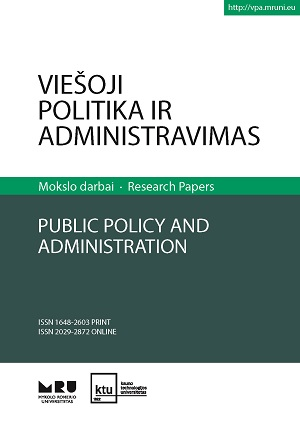Government Regulation Of Industry Articles
Government regulation of industry is a subject that has been debated for decades. Some argue that it stifles innovation and growth, while others believe it is necessary to protect the interests of the public. In this article, we will explore the different perspectives on government regulation and its effects on businesses.
1. The Benefits of Government Regulation
Government regulation can provide several benefits to businesses and the public. Here are some key points to consider:
Government regulation ensures consumer safety and protection. By setting standards and guidelines, regulations prevent companies from producing harmful or low-quality products. This helps build trust among consumers and establishes a level playing field for businesses.
Regulations also promote fair competition. They prevent monopolies and anti-competitive practices, ensuring that businesses have equal opportunities to thrive in the market. This fosters innovation and encourages companies to continually improve their products and services.
Furthermore, government regulation can have a positive impact on the environment. By implementing and enforcing environmental regulations, industries are compelled to minimize their ecological footprint. This can lead to sustainable practices and a healthier planet for future generations.
2. The Challenges of Government Regulation
While government regulation has its merits, it also presents challenges for businesses. Here are a few points to consider:

Excessive regulation can hinder innovation and economic growth. When regulations are too stringent or complicated, businesses may struggle to comply, diverting resources away from research and development. This can stifle creativity and slow down progress in various industries.
Another challenge is the cost associated with compliance. Businesses must invest time, effort, and funds to ensure they adhere to government regulations. This can be particularly burdensome for small businesses, which often have limited resources already.
Additionally, regulations may vary between jurisdictions, making it difficult for businesses operating in multiple locations. Compliance with diverse regulations adds complexity and can hinder business expansion and efficiency.
3. The Role of Government Regulation in Industries
Government regulation plays a crucial role in different industries. Here are some examples of how regulation impacts specific sectors:
Healthcare
Government regulation in the healthcare industry is essential to ensure patient safety and quality of care. Regulatory bodies oversee medical practices, drug approvals, and healthcare facility standards. This protects patients and enables them to trust in the healthcare system.
Finance
In the financial sector, government regulation aims to protect consumers and maintain the stability of the economy. Regulations like the Dodd-Frank Act in the United States create rules for banks, ensuring transparency, mitigating risks, and preventing another financial crisis.
Environment
Environmental regulations are crucial for protecting the planet and addressing issues like climate change. Governments set standards to restrict harmful emissions, regulate waste disposal, and promote sustainable practices. This influences industries such as energy, manufacturing, and transportation.
Technology
The technology industry often faces debates about the appropriate level of government regulation. While some regulation is necessary, overly restrictive policies can stifle innovation. Governments must strike a balance to foster technological advancements while protecting privacy, security, and consumer rights.
FAQs
Q: Does government regulation always benefit businesses?
A: While government regulation can have positive effects on businesses, it is not a one-size-fits-all approach. The impact depends on various factors, including industry, the specific regulation, and compliance costs.
Q: Can government regulation create barriers to market entry?
A: Yes, in some cases, regulations can create barriers to entry for new businesses. Depending on the industry, compliance costs and bureaucratic processes may discourage entrepreneurs. However, regulations can also prevent unfair competition and protect consumers.
Q: How can businesses navigate complex government regulations?
A: Businesses can seek legal counsel to ensure compliance with relevant regulations. Staying informed about changes in regulations and engaging in industry associations can also provide valuable insights and resources.
Conclusion
Government regulation of industries has its pros and cons. While it ensures consumer safety, fair competition, and environmental protection, it can also impede innovation and burden businesses with compliance costs. The role of government regulation varies depending on the industry, and finding the right balance is crucial to foster growth, protect consumers, and address societal concerns.
The Proper Role Of Government In The Economy – The Daily Libertarian
government regulation economics economy political cartoons regulations market price business role daily costs regulatory control intervention interference but farhoud federal
Stream 40 Years Of Gill Netting In British Columbia By Cortes Currents
 Image Source : soundcloud.com
Image Source : soundcloud.com CEEOL - Article Detail
 Image Source : www.ceeol.com
Image Source : www.ceeol.com ceeol
Government Regulation Of Industry Training – Edukite
 Image Source : edukite.org
Image Source : edukite.org edukite
Specialist Contractors Call For Government Regulation Of The
 Image Source : www.theconstructionindex.co.uk
Image Source : www.theconstructionindex.co.uk regulation group specialist contractors industry trevor hursthouse construction authority calls government call sec regulatory chairman obe wants
Is Government Regulation Really So Bad For Business? - The Business
government regulation business bad
Government Regulation Does Not Make Us Safe—capitalism Does | The
 Image Source : www.nassauinstitute.org
Image Source : www.nassauinstitute.org government regulation bureaucracy does urban capitalism safe make tape red bureaucrats planning forsyth misconceptions enjoy part frederick express
The Regulation Madness Is Coming To An End | FreedomWorks
 Image Source : www.freedomworks.org
Image Source : www.freedomworks.org regulation regulations madness coming end freedomworks
The proper role of government in the economy – the daily libertarian. Government regulation of industry training – edukite. The regulation madness is coming to an end. Government regulation does not make us safe—capitalism does. Regulation group specialist contractors industry trevor hursthouse construction authority calls government call sec regulatory chairman obe wants